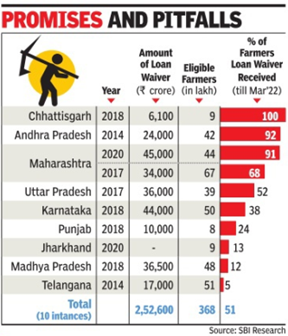Context
- Freebies seem to have come to a tipping point as polling for crucial state elections, a prelude to the 2024 Lok Sabha election, are set into motion.
- The Supreme Court also recently drew attention to the substantial fiscal cost of freebies, while hearing a petition demanding the de-recognition of political parties that promise “irrational freebies” to voters.
- The article discusses the economic causes and consequences of freebies, and its separation from essential welfare activities.
Freebies and entitlement difference
- Freebies are public welfare measures , goods or services, offered free of cost by the government. These diminish the crucial distinction between those who can afford to pay and who can’t.
- Entitlement on the other hand, is a bona fide benefit for those who lack affordability.
- For instance, free electricity for everyone is a freebie while free food grain for 80cr population during pandemic is an entitlement.
Consequences of freebie culture
- No fresh revenue generation: If governments spend the loan money on populist giveaways that generate no additional revenue, the growing debt burden will eventually implode and lead to increased fiscal deficit and enhanced interest payments.
- No new assets creation: The more States spend on transfer payments, the less they have for spending on physical infrastructure such as power and roads, and on social infrastructure such as education and health, which can potentially improve growth and generate jobs.
- Unsustainable practices: The electoral calculations tempt political parties to place short-term gains ahead of long-term sustainability.
- Never ending trail: The continuity of freebies is another major disadvantage as parties keep on coming up with lucrative offers to lure more number of votes to minimize the risk of losing in the elections.
- Inflationary pressure: Such distribution of freebie commodity largely disrupts demand-supply dynamics.
- Freebies for One, Disaster for Other: As a result of reducing prices for consumers beneficiaries, the government overcharge industrial and commercial contracts in order to maintain the internal fiscal balance. This reduces competitiveness of growing industries which results in slower industrial growth and commercial price hike.
Damaging effects of freebies in Power / Farm sector
- Freebies have evidently caused biggest damage to power sector. For instance, by promising free power, waiving past accumulated bills, etc mindless loan waivers etc.
- The sovereign guarantees by various governments that are mostly unfunded are also a part of freebie culture.
- For example, Centre’s Ujwal DISCOM Assurance Yojana (UDAY) scheme, allowed the state governments that own power distribution companies to take over 75 percent of these companies’ debt till September 2015 and pay back the lenders by selling bonds. This also burdened the state exchequer.
- Past picture: Even a decade ago, power sector had the biggest stake in India’s messy bad loans pile up, with distorted capacity to pay being the underlying cause in a sector already hit by missing fuel linkages, absence of power purchase agreements (PPAs), insufficient equity from promoters and spike in input/coal prices.

Flawed argument to support freebies
- Comparison with haircut: A recent argument to support freebies draws a parallel with the ‘haircut’ taken by banks through Insolvency and Bankruptcy Code (IBC) mechanism or loan write-offs, but such comparison is a flawed argument owing to the following reasons:
- Loan write-offs are purely technical in nature and are added back to bank books if they are recovered.
- Also, IBC laws are adopted internationally to promote entrepreneurship, while ensuring availability of credit and balancing interest of stakeholders.
- Definitions: Haircuts are losses that banks incur on the resolution of stressed assets. It is the percentage difference between what an asset is worth relative to how much a lender will recognize of that value as collateral.
- Loan write off: It is an action taken by the lender when the chances of loan recovery are almost zero and the bank wishes to maintain a clear record of the unrecovered loan amount in their balance sheets.
The minefields ahead
- Pension sector overview: Recent electoral promises made by parties e.g. in Rajasthan, Chhattisgarh, H.P., Jharkhand etc. include bringing back the old pension scheme namely PAYG (pay as you go) pension scheme.
- About PAYG pension scheme: India had this pension scheme for government employees prior to 2004. The scheme provided 50% of the last drawn salary as the pension. Under this scheme, the contributions of the current generation of workers were explicitly used to pay the pensions of current pensioners.
- Hence PAYG scheme involved a direct transfer of resources from the current generation of taxpayers to fund the pensioners, which is fiscally disastrous and divisive in today’s scenario.
- The Shift: In 1998, Vajpayee made the transition towards the new pension scheme by announcing an increase in retirement age from 58 to 60 and constituting a committee.
- Its substitute, the national pension scheme (NPS) took effect from April 1, 2004, during Atal Bihari Vajpayee's second regime in December 2003.
- About NPS: The NPS allows subscribers (government employees) to decide where they want to invest their money by contributing regularly in a pension account throughout their career.
- After retirement they can withdraw a part of the pension amount in a lumpsum and use the rest to buy an annuity for a regular income.
Way ahead
- It’s time for the country to decide if it continues to follow tactics of the past that have limited shelf life for a limited set of users, or to embrace the new world order wholeheartedly where changing geopolitical events are inscribing down the contours of development.
- Sticking with welfare and empowering measures for the deserving classes rather than freebies and that too only after due deliberation is the way forward.










